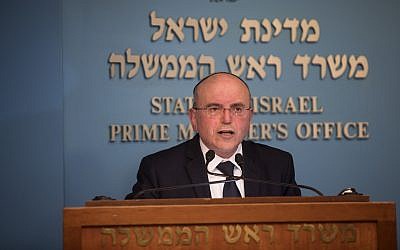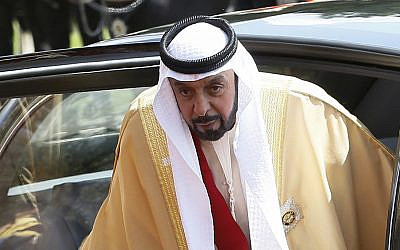Prime Minister Benjamin Netanyahu denied on Sunday that Israeli defense officials had been removed from a delegation set to arrive in the United Arab Emirates on Monday, saying he and Defense Minister Benny Gantz agreed that defense-related talks between Jerusalem and Abu Dhabi would be held at a later date.
“It was decided that the Israeli delegation to the United Arab Emirates, which will leave on Monday, will discuss civilian issues. Additional issues, including security matters, will be discussed later,” the Prime Minister’s Office said in a statement.
According to the Walla news site, defense officials, including representatives of every security and intelligence agency, were originally supposed to fly Monday but will instead travel to the UAE within the next two weeks for separate talks on security aspects of the normalization agreement between the two countries.
The security delegation is to be headed by director-general of the Defense Ministry Amir Eshel, a former air force commander.

Former head of the air force Maj. Gen. (res.) Amir Eshel at the Institute for National Security Studies conference in Tel Aviv on January 28, 2019. (INSS)
The report said that the decision to separate the talks into two sections — civilian-economic, and security — was made jointly by Israel, the United States and the UAE.
Netanyahu’s office had said last week the talks in Abu Dhabi would focus on a number of ways to promote collaboration in multiple fields, including security.
The prime minister’s statement came against a backdrop of continued coalition infighting as Netanyahu and Gantz’s parties remain deeply at odds on several issues.

Prime Minister Benjamin Netanyahu (R) and Defense Minister Benny Gantz attend the weekly cabinet meeting at the Foreign Ministry in Jerusalem on June 21, 2020. (Marc Israel Sellem/Pool/Flash90)
The announcement came just ahead of the first commercial flight between Israel and the United Arab Emirates, scheduled for Monday, which will carry American and Israeli delegations to Abu Dhabi after the two countries agreed to normalize relations.
The flight, an Israeli El Al airliner, will carry a US delegation headed by US President Donald Trump’s senior adviser and son-in-law Jared Kushner and National Security Adviser Robert O’Brien, as well as special envoy for international negotiations Avi Berkowitz.
The Prime Minister’s Office said the Israeli delegation aboard the August 31 flight would be led by National Security Adviser Meir Ben-Shabbat.

Meir Ben-Shabbat, the head of the National Security Council, speaks during a press conference at the Prime Minister’s Office in Jerusalem, on April 2, 2018. (Hadas Parush/Flash90)
According to Army Radio, a preparatory team from Israel arrived in the UAE on Friday ahead of the formal delegation.
The president of the United Arab Emirates on Saturday issued a decree abolishing a law that had boycotted Israel and allowing trade and financial agreements between the two nations.
The state-run WAM news agency said the move formally ending the boycott came on the orders of Sheikh Khalifa bin Zayed Al Nahyan, the ruler of Abu Dhabi and the Emirates’ leader.
WAM said the new decree allows Israelis and Israeli firms to do business in the UAE, a federation of seven sheikhdoms on the Arabian Peninsula. It also allows for the purchase and trade of Israeli goods.
“The decree of the new law comes within the UAE’s efforts to expand diplomatic and commercial cooperation with Israel,” WAM said. It lays out “a roadmap toward launching joint cooperation, leading to bilateral relations by stimulating economic growth and promoting technological innovation.”

In this 2013 photo, President of the United Arab Emirates Sheik Khalifa bin Zayed Al Nahyan arrives in Windsor in England (AP Photo/Kirsty Wigglesworth, pool)
Some Israeli firms had already signed deals with Emirati counterparts. But the repeal of the law widens the likelihood of other joint ventures, such as in aviation, banking, and finance.
The decree formally eliminates a 1972 law on the books since just after the UAE’s formation. That law mirrored the widely held stance by Arab nations at that time that recognition of Israel would only come after the Palestinians had an independent state of their own.
Israel and the UAE announced on August 13 that they were establishing full diplomatic relations, in a US-brokered deal that also required Israel to suspend its plan to annex parts of the West Bank.
The UAE is just the third Arab country to agree to official relations with Israel, after Egypt and Jordan. Israeli and American officials have expressed hope that other Gulf Arab countries will soon follow suit, with relations based on mutual commercial and security interests, and their shared enmity toward Iran.
 RSS Feed
RSS Feed















 August 30th, 2020
August 30th, 2020  Awake Goy
Awake Goy  Posted in
Posted in  Tags:
Tags: 













